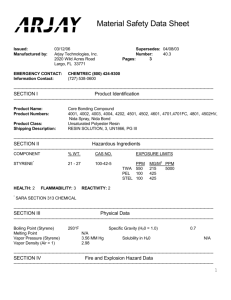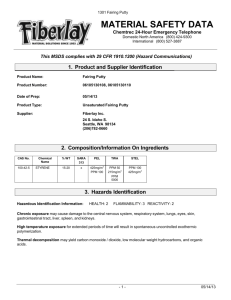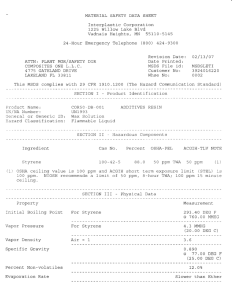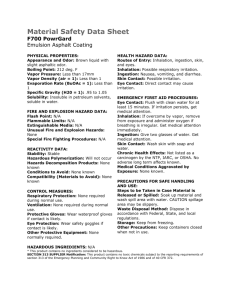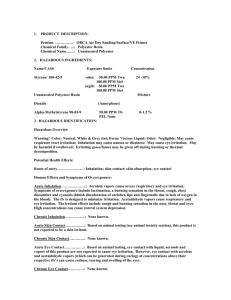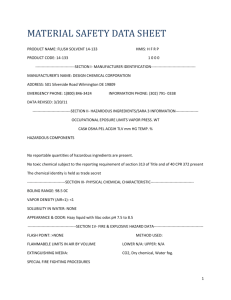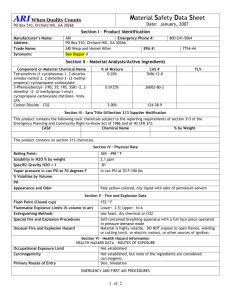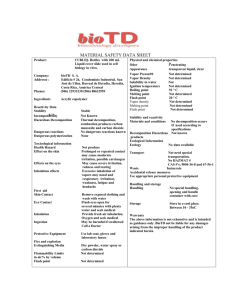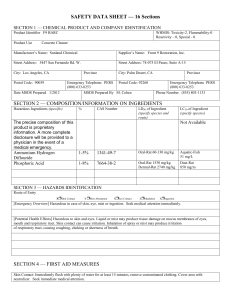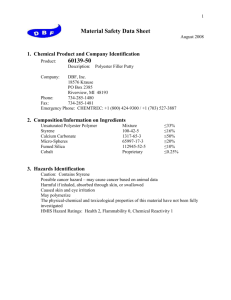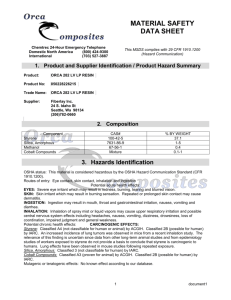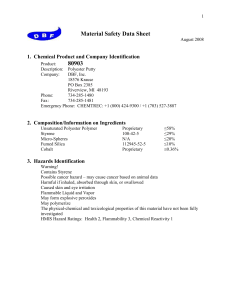Reactivity: 2
advertisement
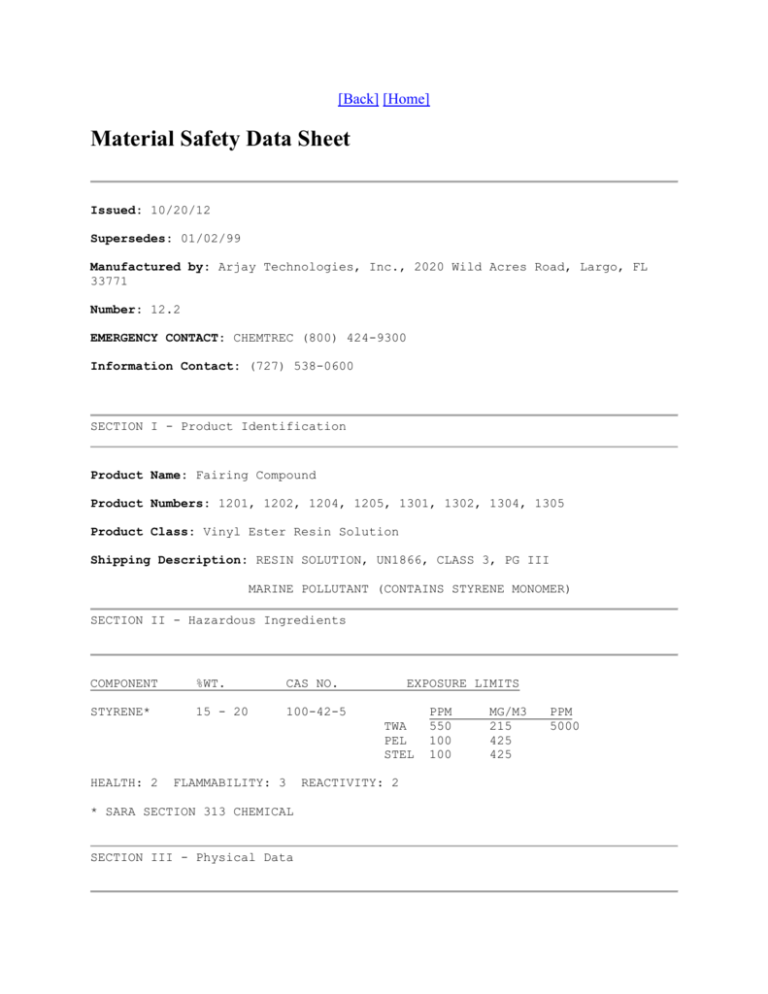
[Back] [Home] Material Safety Data Sheet Issued: 10/20/12 Supersedes: 01/02/99 Manufactured by: Arjay Technologies, Inc., 2020 Wild Acres Road, Largo, FL 33771 Number: 12.2 EMERGENCY CONTACT: CHEMTREC (800) 424-9300 Information Contact: (727) 538-0600 SECTION I - Product Identification Product Name: Fairing Compound Product Numbers: 1201, 1202, 1204, 1205, 1301, 1302, 1304, 1305 Product Class: Vinyl Ester Resin Solution Shipping Description: RESIN SOLUTION, UN1866, CLASS 3, PG III MARINE POLLUTANT (CONTAINS STYRENE MONOMER) SECTION II - Hazardous Ingredients COMPONENT %WT. CAS NO. STYRENE* 15 - 20 100-42-5 EXPOSURE LIMITS TWA PEL STEL HEALTH: 2 FLAMMABILITY: 3 * SARA SECTION 313 CHEMICAL SECTION III - Physical Data REACTIVITY: 2 PPM 550 100 100 MG/M3 215 425 425 PPM 5000 Boiling Point (Styrene) Specific Gravity (H20 = 1.0) Melting Point Percent Volatile by Volume Vapor Pressure (Styrene) Solubility in H20 Vapor Density (Air = 1) 293 deg F 0.62 N/A 10-14 3.56 MM Hg N/A 2.98 SECTION IV - Fire and Explosion Hazard Data Flash Point (Styrene) Flammable Limits (Percent by Volume) 90 deg F PENSKY-MARTEN CLOSED CUP LEL : 1.10% UEL : 6.10% Extinguishing Media: fire Use foam, carbon dioxide or chemical Special Fire Fighting Procedures: Firefighters fighting apparatus. Cool tanks and drums with water. should wear self contained breathing apparatus Unusual Fire and Explosion Hazards: extended periods and protective clothing. High temperature exposure for of time will result in spontaneous uncontrolled exothermic polymerization. SECTION V - Reactivity Data Stability: exposure Stable under normal conditions. Avoid to temperatures above 100 deg F or 38 deg C. Incompatibility: acids, Avoid contact with strong mineral peroxides, oxidizing agents, and polymerization catalysts. Hazardous Polymerization: Hazardous Decomposition Products: SECTION VI - Health Hazards Can occur Thermal decomposition may yield carbon monoxide/dioxide, low molecular weight hydrocarbons, and organic acids. MAJOR EXPOSURE HAZARD: Effects of overexposure: Eye Contact: blurred vision Skin Contact: cause INHALATION, SKIN CONTACT, EYE CONTACT Severe irritation, redness, tearing, Prolonged or repeated exposure can moderate irritation, de-fatting, dermatitis, and sensitization. Inhalation: cause nasal Excessive inhalation of vapors can and respiratory irritation, dizziness, weakness, fatigue, nausea, and headache. High concentrations may result in narcosis (central nervous system depression). Can cause gastrointestinal irritation, nausea, vomiting and diarrhea. Aspiration of material into lungs can cause chemical pneumonitis, which can be fatal. Chronic exposure may cause damage to the central nervous system, respiratory system, lungs, eyes, skin, gastrointestinal tract, liver, spleen, and kidneys. Other health effects: IARC (International Agency for Research on Cancer) has reclassified styrene from a Group 3 substance to a Group 2B substance. This is not based on any significant new evidence that styrene might be carcinogenic, but rather on a broadening of the definition for Group 2B classification. SECTION VII - Emergency and First Aid Procedures Inhalation: stopped, administer Remove from exposure. If breathing is artificial respiration or oxygen as indicated. Seek medical aid; if symptoms persist, consult a physician. Skin Contact: skin thoroughly with Remove contaminated clothing and wash soap and water. If irritation continues, seek medical aid. Eye Contact: at least 15 minutes. Ingestion: physician. Flush with large amounts of water for Call a physician. Do not induce vomiting. Call a SECTION VIII - Special Protection Information Skin Contact: polyethylene garments are Eye Contact: shields recommended. Ventilation: used to control the Polyvinyl alcohol gloves and recommended. OSHA compliant goggles or face Local exhaust ventilation should be emission of air contaminates. General dilution ventilation may assist with the reduction of contaminate Other Equipment: located in the work areas. concentrations. Emergency eye wash stations should be SECTION IX - Special Precautions in Storage and Handling Avoid prolonged or repeated contact with skin. Avoid eye contact. Store in a cool dry place away from oxidizers. Do not store in direct sunlight. Work with adequate general and local exhaust ventilation to minimize exposure to vapors. SECTION X - Regulatory Status TSCA STATUS: This substance or mixture appears on the TOXIC SUBSTANCES CONTROL ACT INVENTORY. SARA Hazard categories (section 311 and section 312): Reactivity, Immediate Health, Delayed Health, Fire Hazardous Material Identification System Health: 2 Flammability: 3 Reactivity: 2 NFPA Rating (Nat'l Fire Protection Association) Health: 2 Flammability: 3 Reactivity: 2 SECTION XI - DISCLAIMER THE INFORMATION IN THIS MSDS WAS OBTAINED FROM SOURCES BELIEVED TO BE ACCURATE. THE INFORMATION, HOWEVER, IS PROVIDED WITHOUT ANY REPRESENTATIONS OR WARRANTY, EXPRESSED OR IMPLIED, REGARDING ITS ACCURACY OR COMPLETENESS. [home]
